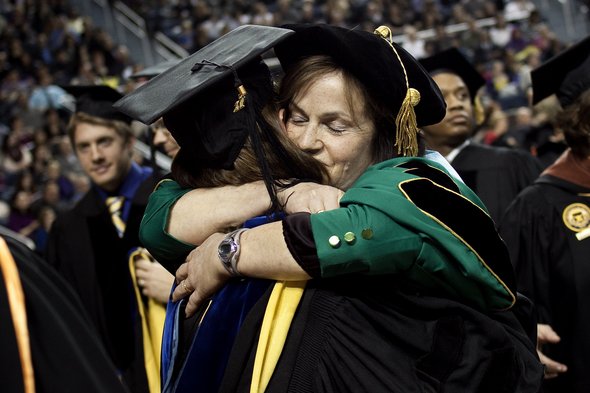Four U-M professors among scholars dubbed most influential education thinkers

Dean of the School of Education Deborah Loewenberg Ball hugs a graduate during winter 2011 commencement at Crisler Arena.
Four University of Michigan professors were recently ranked among the 121 most influential education scholars in 2012 by Education Week columnist Rick Hess.
U-M School of Education professor David K. Cohen was dubbed the tenth-most influential education scholar in the nation.
SOE Dean Deborah Loewenberg Ball, who recently hosted U.S. Secretary of Education Arne Duncan for a roundtable discussion, was ranked 32nd on the list. Public Policy professors Brian A. Jacob and Susan Dynarski were ranked 53 and 64, respectively. Both specialize in education policy.
The list, which Hess calls the Edu-Scholar Public Presence Rankings, is based on the amount and popularity of books, articles and academic scholarship each scholar publishes and the scholar's presence among a variety of media outlets.
In his rankings, Hess tracks the number of times scholars are mentioned in the media. For example, Cohen was mentioned by blogs at least 50 times and Ball was mentioned by education press outlets about four times between Jan 1, 2011, and Dec. 20, 2011.
The rankings also take into consideration an academic's status as a "Google scholar," which is tracked by the number of articles and books a professor has authored that are widely cited. Cohen scored a 33 and Ball scored a 50. The median score among the 121 professors was 20.
The top-ranked scholar is Stanford University's Linda Darling-Hammond, who received a Google scholar score of 83 and was mentioned by education press outlets about 42 times and received more than 50 blog mentions.
Standford's education school is ranked fourth in the nation by U.S. News and World Report, while U-M's school is ranked ninth.
In addition to his blogging/columnist duties at Education Week, Hess is the American Enterprise Institute's director of education policy studies.
Check out the rankings here and methodology behind them here.
Kellie Woodhouse covers higher education for AnnArbor.com. Reach her at kelliewoodhouse@annarbor.com or 734-623-4602 and follow her on twitter.


Comments
trespass
Fri, Jan 6, 2012 : 2:52 a.m.
Some guys list of favorites? This sounds like a University of Michigan press release rather than reporting. Why don't you look into the lawsuit filed by one of Dean Ball's faculty members against her last year. The suit alleges that Dean Ball did not want to compete with the faculty member for grants (he was getting grants that she also applied for) so she retaliated by creating a story that he was crazy and took him out of classes he was teaching just before the end of the semester. That really sounds like one of the 121 most influential education scholars doesn't it. If someone is a Dean, they are more likely to be asked to appear on television or the radio. Does that make them "influential"? Does it make their scholarship better? Does it make UM a better school? I would rather read a piece that you researched yourself rather than a press release from UM.
BhavanaJagat
Thu, Jan 5, 2012 : 5:08 p.m.
The God of Learning : In Indian tradition, the God of Learning is represented by the personality known as Lord Shiva. To commence academic learning, a typical Indian student would write the five word Mantra known as 'Na maH Si va ya' and would formally declare 'Siddham na maH'. It means, 'Salutations to Shiva(Siva), and I am ready and offer my salutations. The idea is that of the student accepting responsibility for his learning and expressing a willingness to think for himself when information is shared or provided by the Teacher. A great educator or teacher is a person who would present correct information to the student and guide him/her to apply his own mind to understand the contents of the information to complete the learning process. This ranking system as revealed in this story does not indicate as to how these educators have provided such guidance to their students. It makes no difference if their names are mentioned in media, and it makes no difference if they have published several articles in academic journals. The criteria that I would use is not that of their personal influence upon the thoughts of others. If their names are mentioned in several blogs, I would like to check and see if those blog authors have applied their personal thinking abilities to present information shared in those blog posts. I would say that these educators are great teachers if they have guided students to get transformed into original thinkers in the specific areas of academic learning in which they have worked together.
microtini
Thu, Jan 5, 2012 : 2:18 a.m.
These irony tower-dwellers are education's version of the 1%.
Dog Guy
Wed, Jan 4, 2012 : 7:27 p.m.
As a longtime teacher, I have often wondered who is responsible for the overall general direction of public education. Thank you, Rick Hess, for the list of 121 suspects.